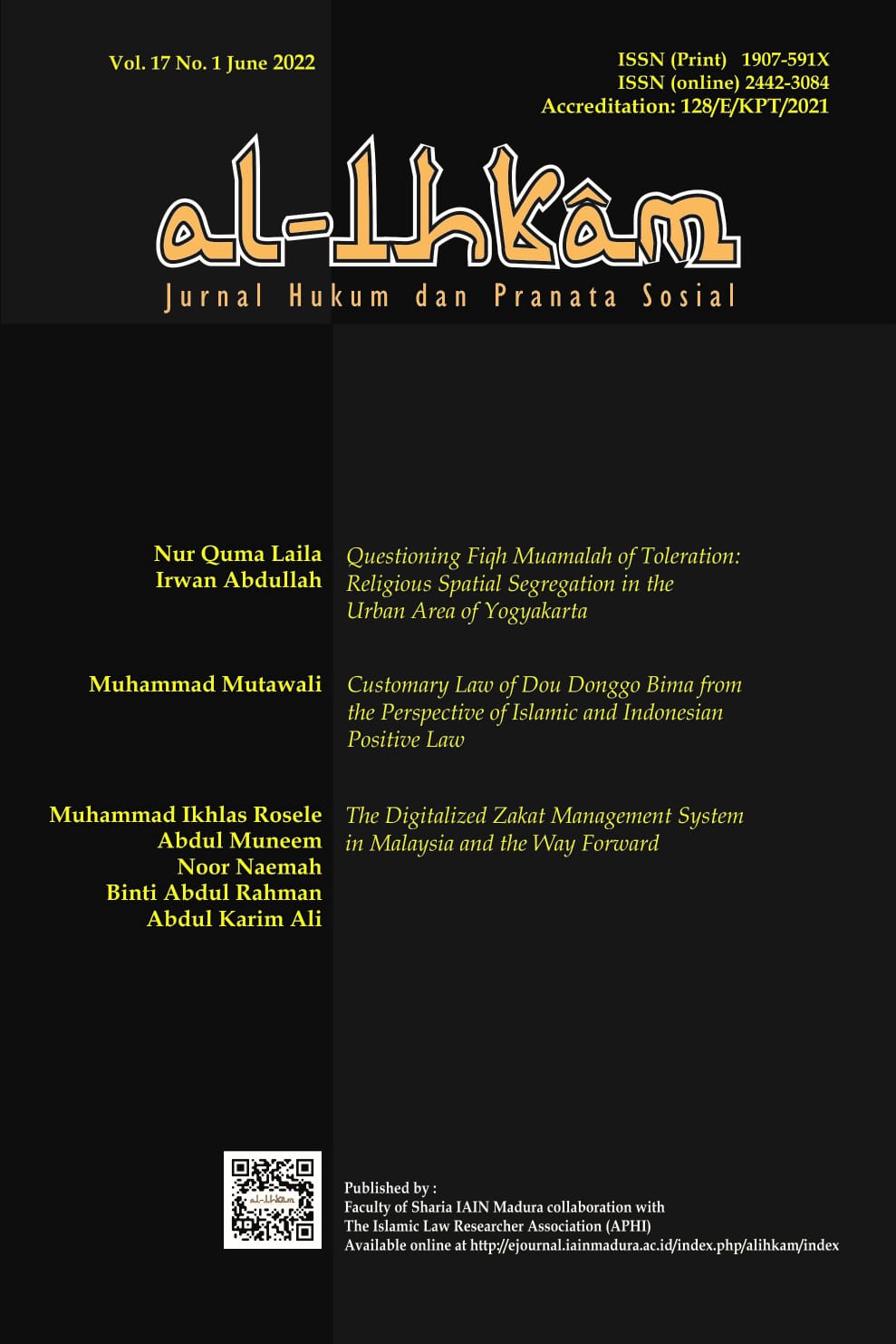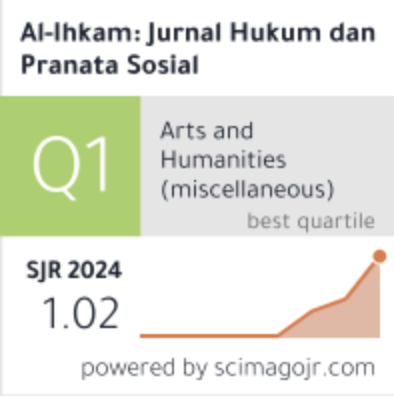Al-Mubâdalah fî Mafhûmi Fiqhi al-Mar‛ah al-Mu’âshirah bî Indûnîsiyâ
 Abstract views: 1074
,
Abstract views: 1074
,
 PDF downloads: 586
PDF downloads: 586
Abstract
Man is a leader of the household, while the wife serves as the household manager. Generally, this paradigm is embedded in our society because men are always put as the main guard at the front while wives are always set in the limited area. Contextually, the problem is in the role of women which is no longer solely in the domestic sphere. Most of them also have a role outside the home to help husbands earn a living. The purpose of this study is to obtain a reconstruction of reciprocal fiqh (mubâdalah fiqh) principle in terms of rights and obligations of both husband and wife. This research is a literature review with a qualitative type using the reciprocal (mubâdalah) approach. The results of this study show that partners in realizing justice in the household, according to the mubadalah approach, are required to make mutual help through working together, such as mutual consultation, mutual democracy and mutual taking and giving in building harmonious relationship.
الرجل هو رب الأسرة والزوجة ربة المنزل. هذا النموذج جزء لا يتجزأ من مجتمعنا بشكل عام، لأن الرجل هو الحارس الرئيسي وكان دائمًا في المقدمة بينما تكون الزوجات دائمًا في المنطقة المحدودة. وتكون المشكلة في أن دور المرأة لم يعد في المجال المنزلي فقط، بل معظمهن أيضًا لهن دور خارجَ المنزل لمساعدة الأزواج في كسب لقمة العيش. والسؤال كيف تتم حقوق وواجبات الزوج والزوجة في هذا السياق؟ الغرض من هذه الدراسة هو إعادة بناء الحقوق والالتزامات الجديدة التي تعكس مبادئ فقه المبادلة من حيث حقوق والتزامات الزوج والزوجة. هذا البحث عبارة عن مراجعة أدبية، ونوعي بمنهج التبادل (المبادلة). نتائج هذه الدراسة أن الشركة بين الرجل والمرأة في تحقيق العدالة في الأسرة يجب أن تكون مساعدة متبادلة في العمل معا مثل التشاور، والديمقراطية، والإحسان لبعضهم البعض في المعاملة
Downloads
References
Agnia, Dina. “Kajian kritis budaya patriarkhisme dalam agama dan keadilan perempuan (studi ketentuan poligami dalam uu. No. 1 tahun 1974).” Fikri : Jurnal Kajian Agama, Sosial Dan Budaya 1, no. 1 (2016): 23–44. https://doi.org/10.25217/JF.V1I1.6.
Al-Najjār, ʿAbd al-Majīd. “Maqāṣid Al-Sharīʿah Bi Abʿād Jadīdah.” Beirut: Dar el-Gharb al-Islami, 2008.
Anggoro, Taufan. “Konsep Kesetaraan Gender Dalam Islam.” Afkaruna: Indonesian Interdisciplinary Journal of Islamic Studies 15, no. 1 (June 25, 2019): 129–34. https://doi.org/10.18196/AIIJIS.2019.0098.129-134.
Asnawi, Habib Shulton. “HAM Dalam Ruang Domestik: Studi Terhadap UU. No. 23 Tahun 2004 Tentang PKDRT.” Al-Mawarid Journal of Islamic Law 11, no. 2 (2011): 26065.
Auda, Jasser. Fiqh Al-Maqâşid Inaţatu Al-Ahkâm Al-Syari’ah Bî Maqâşidihâ. Virgiana, USA: Internasional Institute of Islâmîc Thought, 2006.
———. Maqâşid Al-Syâriah as Philosophy of Islâmîc Law, A System Approach. London: Internasional Institute of Islâmîc Thought, 2008.
Bashin, Kamla. Persoalan Pokok Mengenai Feminisme Dan Relevansinya. Jakarta: Gramedia, 1995.
Engineer, Asghar Ali, Farid Wajidi, and Cici Farkha Assegaf. Hak-Hak Perempuan Dalam Islam. Lembaga Studi dan Pengembangan Perempuan dan Anak, 2000.
Fakih, Mansour. “Analisis Gender Dan Transformasi Sosial, Yogyakarta.” Insist Press, 1996.
Hakim, Lukman. “Corak Feminisme Post-Modernis Dalam Penafsiran Faqihuddin Abdul Kodir.” Jurnal Studi Ilmu-Ilmu Al-Qur’an Dan Hadis 21, no. 1 (2020): 237–59.
Hasyim, Syafiq. Hal-Hal Yang Tak Terpikirkan Tentang Isu-Isu Keperempuanan Dalam Islam. Bandung: Mizan, 2001.
Hermanto, Agus. “Islam, Perbedaan Dan Kesetaraan Gender.” Nizham Journal of Islamic Studies 5, no. 1 (2017). https://e-journal.metrouniv.ac.id/index.php/nizham/article/view/928.
https://referensi.mubaadalahnews.com/2016/09/deskripsi-singkat-perspektif-dan-metode-mubâdalah/
https://referensi.mubaadalahnews.com/2016/09/deskripsi-singkat-perspektif-dan-metodemubâdalah/
https://mubaadalahnews.com/buku/detail_buku/2019-06-06/3,
https://shopee.co.id/Qiraah-Mubâdalah-Tafsir-Progresif-untuk-Keadilan-Gender-dalam-Islam-i.355786 91.1849487112
https://fahmina.or.id/fahmina-institute-terapkan-prinsip-mubâdalah-dalam-organisasi/
https://referensi.mubaadalahnews.com/2016/09/deskripsi-singkat-perspektif-dan-metode-
Ibn Bayyah, ᶜAbdullāh. “Mashāhid Min Al-Maqāṣid,” 2018.
Jalil, Abdul, and Muhammad Taufiq. “Al-Ȃtsȃr Al-Mutarattibah ‘Ȃla PERPPU (Lawȃih Al-Hukûmiyyah Al-Badaliyyah) Min Al-Munazhzhamȃt Al-Mujtama’Iyyah Raqm 2 Li ‘Ȃm 2017 Dlidda Wujûd Hizb Al-Tahrîr Indûnîsiyȃ Min Manzhûr Saddi Al-Dzarî’Ah.” AL-IHKAM: Jurnal Hukum & Pranata Sosial 14, no. 1 (2019): 144. https://doi.org/10.19105/al-ihkam.v14i1.1982.
KAU, Sofyan A. P., and Zulkarnain Suleman. Fikih Feminis: Menghadirkan Teks Tandingan. Yogyakarta: Pustaka Pelajar, 2014.
Kodir, Faqihuddin Abdul. “Mafhum Mubâdalah: Ikhtiar Memahami Qur’an Dan Hadits Untuk Meneguhkan Keadilan Resiprokal Islam Dalam Isu-Isu Gender.” Jurnal Islam Indonesia 6, no. 2 (2016).http://jurnal-islamindonesia.isif.ac.id/index.php/Jurnal-Islam Indonesia/article/view/28.
Muhammad, K H Husein. Fiqh Perempuan; Refleksi Kiai Atas Wacana Agama Dan Gender. LKIS PELANGI AKSARA, 2001.
Mulia, Siti Musdah. Islam Dan Hak Asasi Manusia, Konsep Dan Implementasinya. Jakarta: Naufan Pustaka, 2010.
Munti, Bantara. “Ratna.” Posisi Perempuan Dalam Hukum Islam Di Indonesia. Yogyakarta: LKiS, 2005.
Qadir, Faqihuddin Abdul. “Qira’ah Mubâdalah: Tafsir Progresif Untuk Keadilan Gender Dalam Islam.” Yogyakarta: IRCiSoD, 2019.
Rahman, Fazlur. “Status Wanita Dalam Islam, Sebuah Penafsiran Pemikiran Modernis.” As-Syir’ah 35, no. II (2001).
Santoso, Lukman Budi. “Eksistensi Peran Perempuan Sebagai Kepala Keluaraga (Telaah Terhadap Counter Legal Draf-Kompilasi Hukum Islm Dan Qira’ah Mubâdalah).” Marwah: Jurnal Perempuan, Agama Dan Jender 18, no. 2 (January 21, 2020): 107–20. https://doi.org/10.24014/MARWAH.V18I2.8703.
Savitri, Niken. HAM Perempuan. Bandung: PT. Rafika Aditama, 2008.
Taufiq, Muhamad. “Nikah Sirri Perspektif Maqashid Syariah.” Al-Manhaj: Journal of Indonesian Islamic Family Law 1, no. 2 (2019): 114. https://doi.org/10.19105/al-manhaj.v1i2.3138.
Taufiq, Muhammad. “A Critique against the Perspective of Al-Thufy on the Contradiction of Maslahat and the Holy Text.” Millati: Journal of Islamic Studies and Humanities 5, no. 2 (2020): 121–28. https://doi.org/10.18326/mlt.v5i2.121-128.
———. Filsafat Hukum Islam; Dari Teori Ke Aplikasi. Edited by Abd. Jalil. I. Pamekasan: Duta Media, 2019.
Taufiq, Muhammad, and Masyithah Mardhatillah. “Polygamy in Indonesian Family Law: Analysis of Maqashid Syariah.” Journal of Islam in Asia 17, no. 3 (2020).
Werdiningsih, Wilis. “PENERAPAN KONSEP MUBÂDALAH DALAM POLA PENGASUHAN ANAK.” IJouGS: Indonesian Journal of Gender Studies 1, no. 1 (June 22, 2020): 1–16. https://doi.org/10.21154/IJOUGS.V1I1.2062.
Copyright (c) 2022 AL-IHKAM: Jurnal Hukum & Pranata Sosial

This work is licensed under a Creative Commons Attribution-ShareAlike 4.0 International License.
In order to be accepted and published by Al-Ihkam: Jurnal Hukum dan Pranata Sosial, author(s) submitting the article manuscript should complete all the review stages. By submitting the manuscript, the author(s) agreed to the following terms:
- The copyright of received articles shall be assigned to Al-Ihkam: Jurnal Hukum dan Pranata Sosial as the publisher of the journal. The intended copyright includes the right to publish articles in various forms (including reprints). Al-Ihkam: Jurnal Hukum dan Pranata Sosial maintain the publishing rights to the published articles.
- Authors are permitted to disseminate published articles by sharing the link/DOI of the article at Al-Ihkam: Jurnal Hukum dan Pranata Sosial. Authors are allowed to use their articles for any legal purposes deemed necessary without written permission from Al-Ihkam: Jurnal Hukum dan Pranata Sosial with an acknowledgment of initial publication to this journal.
- Users/public use of this website will be licensed to CC-BY-SA.



.png)
_1.png)


_page-00011.jpg)


